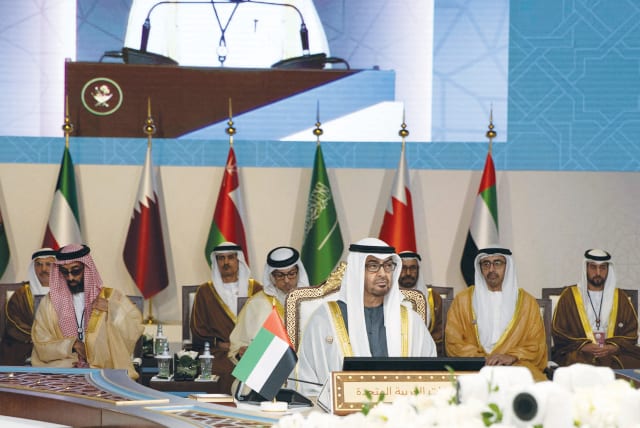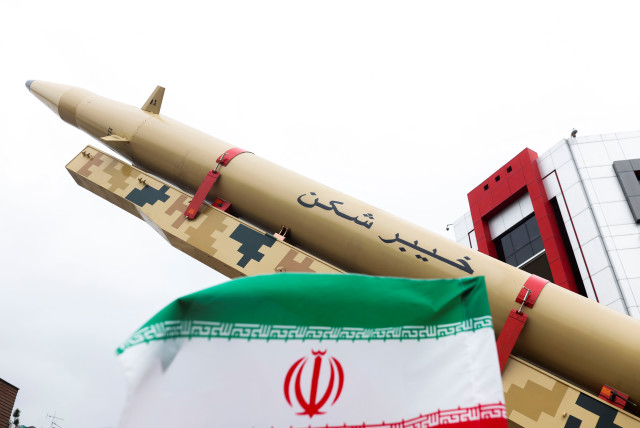Iran’s vision of security and stability isn't grounded in reality - opinion

“The Islamic Republic will never consider its territorial sovereignty negotiable.”
The Iranian regime has always been critical of foreign military presence in the Gulf region and speaks of the importance of regional cooperation as the only fundamental guarantee – from its point of view – of achieving stability. This discourse may be realistic and logical in theory, but it collapses at the first comparison between Iran’s words and actions.
The Iranian regime’s general and repeated positions toward its Arab neighbors in the Gulf Cooperation Council countries over the last period have not undergone any positive change corresponding to the developments observed recently in relations between the Arab countries of the Gulf.
Iranian Foreign Ministry spokesman Nasser Kanaani on the joint Emirati-Kuwaiti statement regarding the three occupied Emirati islands.
Kanaani said: “As has been repeatedly emphasized, the three islands of Abu Musa, the Greater Tunb and the Lesser Tunb are an inseparable and eternal part of Iranian territories, and referring to them in this statement or repeated statements at other meetings is devoid of any political and legal value and is considered interference in Iran’s internal affairs.”
He added that “The Islamic Republic will never consider its territorial sovereignty negotiable.”
In addition to the tone of arrogance and superiority to which Iranian political discourse is accustomed regarding the issue of the three Emirati islands, Tehran never stops to realize that the three-island question will remain a permanent obstacle in its relations with the United Arab Emirates unless a solution is found in accordance with the civilized formulas proposed by the UAE: either through direct negotiations according to a precise timetable, or by submitting the issue to international arbitration.
Personally, I don’t see why Tehran should persist in rejecting either or both of these formulas, given that it is fully convinced of the legality of the islands’ situation and of its alleged sovereignty over them.
Iran’s intransigence is not limited to the question of the Emirati islands but also extends to another issue linked to other neighbors of the Gulf Cooperation Council countries Kuwait and Saudi Arabia, namely Al-Durra gas field.
Kanaani commented on the Emirati-Kuwaiti statement on this subject, saying, “We have repeatedly said that making unilateral claims in such statements does not grant any rights to the claimant,” thereby parroting the Iranian intent to exercise hegemony by imposing opinions on others and denying them their rights – or even denying them a declaration of their rights or their right to insist on them.
Iran continues to reject Gulf States' claims
Iran has also rejected the final declaration of the 159th meeting of the Foreign Ministers of the Gulf Cooperation Council held in Riyadh, which affirms that “Kuwait and Saudi Arabia have every right to exploit the natural resources of this region in accordance with the provisions of international law and on the basis of the agreements concluded and in force between them.”
The Iranian Foreign Ministry spokesman stated that Tehran believed an agreement could be reached on the issue of Al-Durra in an atmosphere of cooperation, constructive interaction, and respect for the interests of the parties concerned.
However, he said he considered the positions of the Gulf Cooperation Council countries regarding Kuwait’s and Saudi Arabia’s rights to the field to be “unilateral, groundless, and non-constructive.”
He also stated that his country’s view of relations with its neighbors was based on “the attempt to build positive and constructive atmospheres and focus on common and friendly issues,” and that it was “unacceptable to raise such issues in unilateral statements under any circumstances.”
This evasive Iranian rhetoric on contentious issues between Tehran and the Gulf Cooperation Council countries does not serve the interest of a real improvement in the atmosphere between neighboring Gulf countries, nor does it align with the Iranian vision that seeks security solutions for regional stability.
In the world of politics and international relations, no problem is insoluble if there is will and positive intentions. However, Iran approaches the search for solutions to existing problems with its neighbors from the prism of hegemony and the need for all to accept its views, even if these are based on continuing to occupy the lands of others – or stealing their rights to energy or other resources.
We do not know how cooperation and a positive atmosphere can emerge under this unilateralism that straddles issues and seeks to impose views – not to mention the promotion of economic and trade cooperation – while freezing and bypassing contentious issues that may be useful to build trust and pave the way for collaboration but is no alternative to long-term final solutions to disputes.
THE TRUTH is that building trust across the Gulf requires more than mutual declarations and visits; it requires a genuine effort on Iran’s part to clear the atmosphere and settle existing disputes through internationally recognized mechanisms for resolving conflicts by legal means, as well as the opening of direct talks with its neighbors on issues of concern such as Iran’s nuclear program and limiting the power of pro-Iranian militias, to ensure the safety of shipping and waterways in the region.
The repeated claims about the independence of the militia’s decision-making and suchlike are a ridiculous assertion that fools no one in their right mind.
The writer is a UAE political analyst and former Federal National Council candidate.
Jerusalem Post Store
`; document.getElementById("linkPremium").innerHTML = cont; var divWithLink = document.getElementById("premium-link"); if (divWithLink !== null && divWithLink !== 'undefined') { divWithLink.style.border = "solid 1px #cb0f3e"; divWithLink.style.textAlign = "center"; divWithLink.style.marginBottom = "15px"; divWithLink.style.marginTop = "15px"; divWithLink.style.width = "100%"; divWithLink.style.backgroundColor = "#122952"; divWithLink.style.color = "#ffffff"; divWithLink.style.lineHeight = "1.5"; } } (function (v, i) { });

